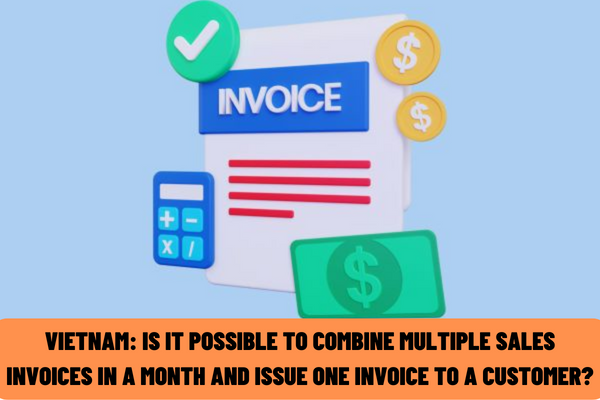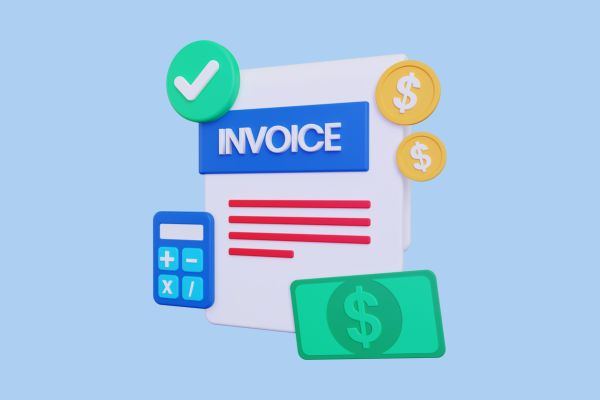Vietnam: Is it possible to combine multiple sales invoices in a month and issue one invoice to a customer?
Is it possible to combine multiple sales invoices in a month and issue one invoice to a customer?
Pursuant to the provisions of Article 4 of Decree No. 123/2020/ND-CP on the rules for issuance of invoices as follows:
Rules for issuance, management and use of invoices and records
1. When selling goods or providing services, the seller shall issue and send invoices to buyers (including goods/services used for sales promotion, advertising or as samples, goods/services gifted, donated, exchanged or used as salary payment to employees and internal use (except goods which are internally rotated in production process), and goods rented, lent or returned). Such invoices shall have adequate contents written according to the provisions in Article 10 hereof, except e-invoices which must follow the standard format prescribed by tax authorities as prescribed in Article 12 hereof.
At the same time, according to the provisions of Article 9 of Decree No. 123/2020/ND-CP on invoicing time in Vietnam as follows:
Invoicing time in Vietnam
1. Invoices for sale of goods (including the sale of state-owned property, property confiscated and put into state fund, and the sale of national reserve goods) shall be issued when the right to own or use goods is transferred to buys, whether the payment of the invoiced amount is made or not.
2. Invoices for provision of services shall be issued upon completion of the provision of services, whether the payment of the invoiced amount is made or not. In case a service is provided with payments collected in advanced or during the provision of that service, an invoice shall be issued when each payment is collected (excluding payments of deposited amounts or advance payments which are made to ensure the execution of contracts for provision of accounting, audit, financial consulting or taxation services; valuation services; technical survey and design services; supervision consulting services; investment construction project formulation services).
3. In case where multiple deliveries are required, or each goods item or service phase is accepted, it shall be mandatory to issue an invoice showing quantity, value of goods or service for each respective delivery or acceptance.
Thus, according to the above provisions, when selling goods or providing services, the seller shall issue and send invoices to buyers in accordance with the rules for issuance, management and use of invoices and records and at the time of invoicing, it is not allowed to combine until the end of the month to issue 1 invoice for many sales.

Vietnam: Is it possible to combine multiple sales invoices in a month and issue one invoice to a customer?
How to handle in case the e-invoice is duplicated twice?
Pursuant to Clause 1, Article 19 of Decree No. 123/2020/ND-CP on handling of erroneous invoices in Vietnam as follows:
Handling of erroneous invoices in Vietnam
1. When a seller discovers that the authenticated e-invoices which have not been sent to buyers contain errors, the seller shall inform the tax authority by using the Form No. 04/SS-HDDT in Appendix IA enclosed herewith of cancellation of such erroneous authenticated e-invoices, and prepare new e-invoices with digital signatures for submission to the tax authority for its issue of new authentication codes in place of the previous ones before sending them out to buyers. The tax authority shall cancel the erroneous authenticated e-invoices on its system.
Thus, if the seller detects that the e-invoice is duplicated twice and this invoice has been granted a tax authority's code but has not been sent to the buyer, the seller shall notify the tax authority of the cancellation of the incorrect e-invoice and issue a new invoice.
After that, the seller digitally signs it and sends it to the tax office to be granted a new invoice code instead of the old invoice to send to the buyer. The tax authority will cancel the invoice that has been issued with an error code that is stored on the tax authority's system.
How to handle if e-invoices have problems and cannot be invoiced?
Pursuant to Article 20 of Decree No. 123/2020/ND-CP guiding troubleshooting for e-invoices with tax authority's code as follows:
Handling of issues related to authenticated e-invoices
1. If the seller is unable to use authenticated e-invoices because of certain issues, the seller shall inform the tax authority or relevant service provider for assistance. While the issues are being fixed, the seller may use authenticated e-invoices at the tax authority’s premises.
2. In case of issues of the tax authority’s authentication code issuing system, the General Department of Taxation shall use the backup system and make an announcement of such issues on its website. The General Department of Taxation may authorize some qualified e-invoice service providers to grant authentication codes while the issues are being fixed.
While the issues are being fixed, the tax authority may sell tax authority-ordered printed invoices to some organizations and individuals. After the issues are successfully fixed, the tax authority shall give a notice to relevant organizations and individuals to continue their use of authenticated e-invoices and submit reports (using form No. BC26/HDG in Appendix IA enclosed herewith) on their use of physical invoices purchased from the tax authority within 02 working days from the date specified in the tax authority’s notice.
3. In case of issues of the system of e-invoice service provider, the service provider shall inform the sellers and request the General Department of Taxation for assistance. The service provider shall quickly fix the issues and assist sellers in creating e-invoices and sending them to the tax authority for authentication as soon as possible.
4. In case the web portal of the General Department of Taxation is unable to receive e-invoice data due to technical issues, the General Department of Taxation shall post a notice on its web portal. The organizations, enterprises and e-invoice service providers shall not transmit e-invoice data to tax authorities during this period.
Within 2 working days from the day on which the General Department of Taxation posts another notice that its web portal is operational, relevant organizations and e-invoice service providers shall transmit e-invoice data to tax authorities. Transmission of e-invoice data to tax authorities after a notice of technical issues is posted on the web portal of General Department of Taxation will not be considered to be late.
Thus, in case an e-invoice encounters a problem during use, the user should contact the tax agency or service provider organization for support and troubleshooting.
LawNet
